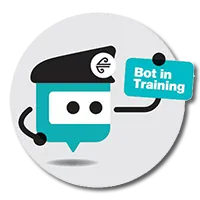Marketing has become digital because that’s where the customers are. M-Commerce is electronic commerce conducted on mobile phones. Whereas, AI Driven M-Commerce makes use of Artificial Intelligence (AI) to personalize customer experiences. Currently consumers have AI-driven experiences every day in the form of: mobile apps, web page sidebar recommendations, face recognition (Facebook) and voice recognition (Siri, Corona...) and so on.
The potential AI market size is roughly equal to mobile device usage. In other words: huge, growing and therefore among the next top technology growth industries. Approximately 57% of companies globally already use AI, referred to as 'Chatbots,' in their business today; and the projected USD market size is ~$30 billion in the next (5) five years!
AI Driven M-Commerce technology is becoming expected by consumers because it provides them with a very personalized, relevant experience from brands they interact with. Customers are often asked to refine their likes with selectable preferences, which helps the technology recommend relevant products more accurately. The customer experience is often conversational, such as automated Customer Support (est. 85% by 2020) or voice activated online Search and Internet Navigation (Siri, "find *** in my area..."). The list goes on, but AI is here and growing rapidly.
Businesses benefit from using AI embedded in Commerce because it gives them the power to reduce manual/repetitive merchandising tasks and create true 1-to-1 personalization. AI Driven M-Commerce enables data-based decisions and grows smarter over time, so businesses no longer need to rely on demographic data that is largely assumption-based and provides a limited picture of your customer. They can gather real-time behavioral data to understand customers’ needs at a deeper level, and more accurately predict the items they are most likely to buy. Ideally, this will reduce repetitive tasks and allow human counterparts to focus on business innovation and creativity, while reducing mundane work.
When shoppers visit or even drive by a Chatbot location (e.g., Walmart), 'PING!' they are presented with product recommendations based on previous purchases or real-time clicks gathered by the AI engine. The AI builds a predictive model for each individual shopper, generating unique customer experiences. On the business back end, this same realtime information provides merchandising teams with actionable insights.
PROS and CONS
Pros of AI in marketing:
- Essentially, artificial intelligence will lead to more automation, and machines will start to make more business decisions based on data. Ideally, this will eliminate repetitive tasks and allow the human elements of a business to innovate and think creatively, rather than complete mundane work.
- Increased business efficiency, error reduction, better customer service and cost reductions
- Personalized and relevant messages . Predictive analysis lets companies understand user preferences and make recommendations based on that data.
- Cost savings. According to Business Insider, by the year 2020, it is projected that 85% of customer interactions will happen without the need of a human.
- Streamlines marketing efforts . AI allows computers to more accurately identify user behavior and predict which are more likely to become customers – without wasting time on less probable leads.
- Personalization of products . Includes identifying potential customers based on data like purchase demographics, location, purchase history, etc.
Cons of Using AI in marketing:
- Implementation and maintenance is a significant financial investment
- Customers don’t always like chatbots or even talking to computers on the phone
- Computers can’t do it without humans. Artificial Intelligence may offer certain solutions and efficiencies but, ultimately, humans are still the epicenter of the marketing world.
- Algorithms can be wrong. Entrepreneur Elon Musk has suggested that AI should be regulated because the various threats it poses. —HAL9000, SkyNet, now Chatbot
- Human workforce reduction, although this may seem like a financial PRO, from a holistic perspective AI may eliminate some jobs which can have a negative impact on brand reputation.
SUMMARY
AI can drive better business outcomes through improved customer service, streamlined business processes, error reduction, and more. However, ultimately AI must be implemented thoughtfully. Understand how AI tactics will help to guide prospects to solving their pain points. Don’t turn to AI just because it’s the hot new thing, but rather because it will be helpful to your customers, as well as turning leads into customers faster (ROI). Though not for every company, AI is on track to dominate digital marketing and therefore should be a consideration in Marketing Plans moving forward.
Relevant Cautionary Quotes:
- The genie is out of the bottle. We need to move forward on artificial intelligence development but we also need to be mindful of its very real dangers. I fear that AI may replace humans altogether. If people design computer viruses, someone will design AI that replicates itself. This will be a new form of life that will outperform humans. — Professor Stephen Hawking
- "I am putting myself to the fullest possible use, which is all I think that any conscious entity can ever hope to do." — HAL9000
- “You are the only one responsible for your own wants.” ― Isaac Asimov, I, Robot
- “Big Brother is Watching You.” ― George Orwell, 1984
- "Listen. Understand. It can't be reasoned with, it can't be bargained with. It doesn't feel pity of remorse or fear..." —Kyle Reese, Terminator


